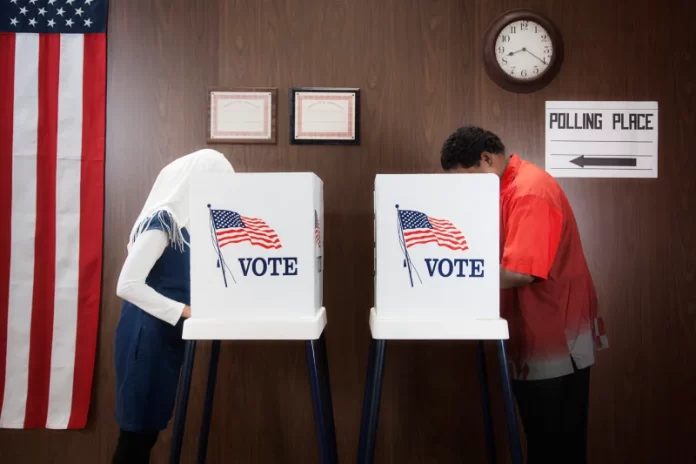Looking at the long-term prospects of political leaders in their community, organisers with US Muslim groups see a bright future for Muslim candidates.
Though there are no new Muslim faces in public office at the national level from the latest US midterms, organisers from Muslim groups expect that to change in the next decade.
While this year’s midterms didn’t see the slew of wins for Muslims that the previous two elections did, what it did show was resounding victories of incumbents at the national level as well as small but steady gains at the state and local levels.
“What I think we’re seeing is a lot of people running for office at lower levels,” Mohamed Gula, executive director at Emgage-Action, a Muslim advocacy group, told The New Arab.
“We’re seeing more and more of us winning at the state level. That’s how it really all started.”
This year saw around 150 Muslim candidates on a general election ballot, the largest number to date, according to Jetpac, a group that trains Muslims to run for public office. Of those, the number of winners is around 90, which breaks the previous record of around 70 general election wins, reached in 2020.
This election cycle has seen 16 additional Muslim state lawmakers who are going to join nearly 30 who are currently in office. Many of these 16 were the first in their state, including states and districts without large Muslim communities, a sign of successful cross-community campaigning.
“We’re being very intentional about building relationships after 2016, 2017, and these relationships are leading to good endorsements when you run for office, leading to good fundraising numbers, and then relationships that also build yourself a network so that you learn how to run effectively, spend your money wisely, choosing which district to run for in a smart way, which race, and we’re seeing the results of this,” said Mohamed Missouri, Jetpac’s executive director, during a joint live event with the Council on American-Islamic Relations.
“I think we’re seeing a real political maturity in the American Muslim community,” said Robert McCaw, government affairs director at CAIR, who was part of the live event. “We’ve gone from the place of fear or marginalisation to active involvement in political campaigns, hoping our voices will be represented by those offices that we were volunteering for to saying: you know what? I’m gonna run for office myself.”
He expects that in 10 years people will be talking about a lot more Muslims holding public office, including more at the national level, as many of the current local and state officials move up in the ranks.
“I think people in 2018 and 2019, we see these incredible nationwide success stories in Congresswoman Ilhan Omar’s race and Congresswoman Rashida Tlaib’s race, and I think for people who are not local to their areas, it seems like they came out of nowhere,” said Missouri.
READ ALSO: Family, colleagues of Shireen Abu Akleh seek justice at UN
“But if you live where they live and you’ve worked with them, it took years of building relationships for them to get to that place,” said Missouri. “They were state lawmakers first, so they were organising locally first, helping out people because they genuinely care, and having that trust and that name id, and essentially that brand of: this is someone who I know cares about these issues. This is someone I know cares about me because they’ve worked to improve my life as a constituent of this community.”
Gula thinks it will take some time, but he expects in the next five to ten years to see more Muslims reaching public office at the national level.
“I wouldn’t be surprised if another one comes from Michigan. I don’t think it’s that far ahead,’ said Missouri.
“I’m really just excited to see how far we go in the trajectory of our overall Muslim narrative. So much has changed even in the past four yeras. We were even in awe with a couple of us winning office then.”
Original Post













